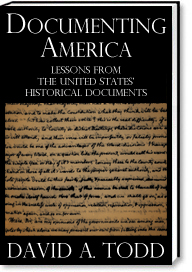On January 23, I wrote about the fiction series I’m developing of Christian church history. I recently completed the first draft of the second book in that series, and hope to publish it in about a month.
 Another series of book-length works that I’m actively working on is my Documenting America series. I have one book out in it, titled Documenting America: Lesson’s from the United States’ Historical Documents. I published this as an e-book in May 2011. I was still learning the ropes of self-publishing, and had only a short story published. I wanted to get a longer work out, but my first novel wasn’t ready, I didn’t think. I wondered what I could do next, and realized I had this book about half done. So I decided to finish and publish it. I added the print book later that year.
Another series of book-length works that I’m actively working on is my Documenting America series. I have one book out in it, titled Documenting America: Lesson’s from the United States’ Historical Documents. I published this as an e-book in May 2011. I was still learning the ropes of self-publishing, and had only a short story published. I wanted to get a longer work out, but my first novel wasn’t ready, I didn’t think. I wondered what I could do next, and realized I had this book about half done. So I decided to finish and publish it. I added the print book later that year.
I realized I had something here, something that could be expanded. Let me back up a moment, and tell how I came upon the idea for this series. Back around 1998 we—my wife and I—were shopping at Helping Hands, our local thrift store. I saw in the book section a 20 volume set titled The Annals of America. Published by the Encyclopedia Britannica people, it took documents from US history and re-published them. It only cost $25 for the 20 volumes, so I bought it, at the time not thinking beyond the pleasurable reading it would give me.
Then our local newspaper developed a program for guest editorials. I realized I could take an item from the Annals—all of which are outside of copyright—and build them into editorials. I would excerpt the document, write a little commentary about it, and show how it relates to an issue we deal with today. The problem would be doing all of that in 750 words. But I managed to do that, and had four of these editorials published.
Thinking about jump-starting my then-new publishing career, I thought I could develop this into a regular newspaper column. I began writing more. Then I realized the newspaper industry was dead, or close thereto, and learned that self-syndication is a very difficult path. I had written about seventeen of these editorials, however. These became the starting point on the first Documenting America. I fleshed it out to thirty chapters. It was nice not having the word limitation that newspaper columns had.
 I wasn’t ready with a lot of new material, but realized DA could be made into a homeschool text, so I went ahead and did that, and published it in 2012. I haven’t sold many of those, though the original DA is my second highest selling book.
I wasn’t ready with a lot of new material, but realized DA could be made into a homeschool text, so I went ahead and did that, and published it in 2012. I haven’t sold many of those, though the original DA is my second highest selling book.
I also realized, as I found more and more sources for historical documents, that there was no end to the books I could write in this style. A friend who read the first one in advance of publication said he couldn’t see what aim I was trying to achieve. I thought about this, and decided it was to help people discover these historical documents, and start reading them. We get history filtered, when we can get it unfiltered in original documents.
I don’t know how well I achieved that with Documenting America and the homeschool edition, but they are out there; people have read them; a few have commented. I’m happy with what I developed. Perhaps someday it will catch on better.
As I said, there’s no end to the books I could write along these lines. Back around 2013 I began work on what I intended to be the second (or third) in the series: Documenting America: Civil War Edition. I was hoping to have this out during the sesquicentennial of the Civil War, which was 2011 to 2015. Alas, I didn’t make it. The busyness of life got in the way. Plus, I was finding it difficult to write the book I wanted to. It was hard to wade through documents, except them, and tie them to an issue of today. I got the book about 40% done, I figure. All events and chapters are identified. A dozen chapters are written, requiring only editing. Four more chapters are started, and three more have the document entered and almost excerpted. My hope is to have this finished and published by May.
After that, who knows? I could take any era in US history and do one of these books. Or, I could base them around key people in our history. Or, I could do them on topics, such as slavery, religion, education, defense, foreign affairs. I played around with titles once, and was up to forty before I had to think hard.
Titles are easy to come by; books a lot harder. Still, I can see myself trying to get one of these out a year, and building up a nice set of books. Will they sell? Who knows? And, I doubt if I’ll ever get forty written. If I did ten or twelve, I’ll feel like I accomplished something.